The guide to owning a Beagle.
Want to know everything there is to know about training your Beagle puppy? Submit your email below, and we’ll send you a one-stop guide on all things puppy training!
Jump to:
Stats at a glance.
History of the Beagle.
The Beagle, a beloved and popular dog breed, has a rich history deeply rooted in British soil. While its exact origins are unclear, the modern Beagle breed was developed in Great Britain during the 1830s.
Reverend Phillip Honeywood, an English clergyman, is credited with establishing a pack that became the foundation for today's Beagle.
His efforts focused on breeding a smaller, more compact hound that could be followed on foot, unlike larger hunting dogs that required horses to keep up.
The name ‘Beagle’ is believed to have originated from the Old English word "beag," meaning small, reflecting the breed's compact size.
This made them popular among hunters who couldn't afford to maintain larger hounds and horses. In fact, a smaller variety known as the ‘pocket Beagle’ was favoured by Elizabeth I and was transported in saddlebags during hunts.
The National Beagle Club of Great Britain, founded in 1890, played a crucial role in promoting and standardising the breed. The club established breed standards and organised field trials, helping to cement the Beagle's reputation as an excellent scent hound.
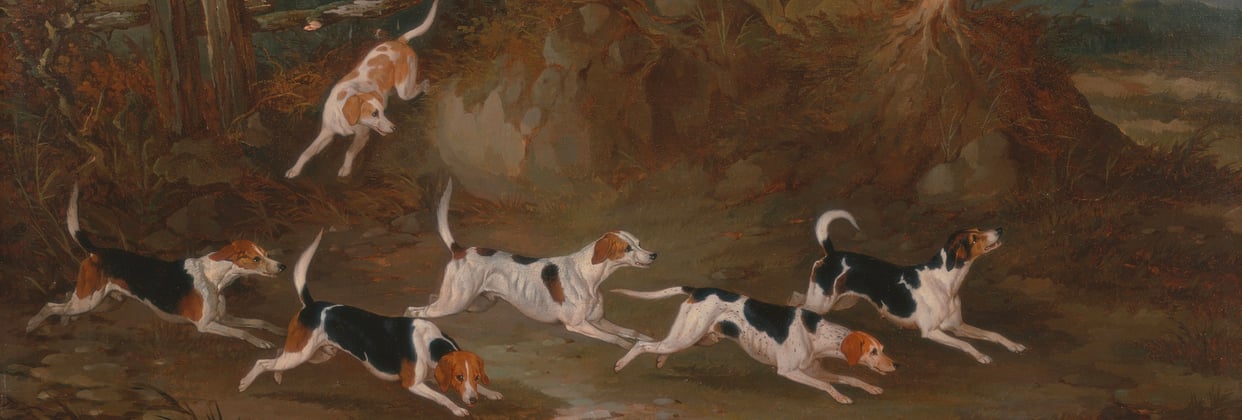

How much is a Beagle puppy (UK)?
In the UK, the cost of a Beagle puppy can vary significantly depending on factors such as the breeder's reputation, the puppy's pedigree and their location.
On average, you can expect to pay between £450 and £1,500 for a Beagle puppy from a reputable breeder.
It's crucial to remember that the initial cost of purchasing a puppy is just a fraction of the overall expense of dog ownership.
Prospective Beagle owners should factor in ongoing costs such as food, veterinary care, grooming, and pet insurance when budgeting for their new furry friend.
Colours and coat types.
Beagle colours
Beagles are known for their distinctive tricolour coat, but they come in a variety of colours and patterns:
Tricolour: The most common and recognisable, featuring black, tan and white
Lemon and white: A pale yellow or cream colour with white
Red and white: A reddish-brown colour with white
Chocolate tri: Brown, tan and white
Blue tri: A dilute black (appearing greyish-blue), tan and white (rare)
Tan and white: Also known as ‘Fawn’
Beagles have a short, dense double coat that is weather-resistant. The topcoat is straight and coarse, while the undercoat is soft and fine. This coat type requires minimal grooming but does shed moderately throughout the year.





Size and weight.
How big does a Beagle get?
Beagles are a small to medium-sized breed, known for their compact and sturdy build. These affectionate and mischievous dogs are popular among dog lovers due to their manageable size and friendly nature.
Whether you're looking at Beagle puppies for sale or adopting a rescue dog, understanding the Beagle's size is crucial for first-time dog owners and experienced pet parents alike.
In the UK, Beagles are typically recognised in two size varieties:
Smaller variety:
Height: Up to 33 cm (13 inches) at the shoulder
Weight: 6.8-9 kg (15-20 lbs)
Larger variety:
Height: 33-38 cm (13-15 inches) at the shoulder
Weight: 9-13.6 kg (20-30 lbs)
It's important to note that individual Beagles may fall slightly outside these ranges. Females tend to be on the smaller end of the scale, while males are often larger and heavier.
Beagles typically reach their full adult height by about 8 months of age, but they may continue to fill out and gain weight until they are about 18 months old.
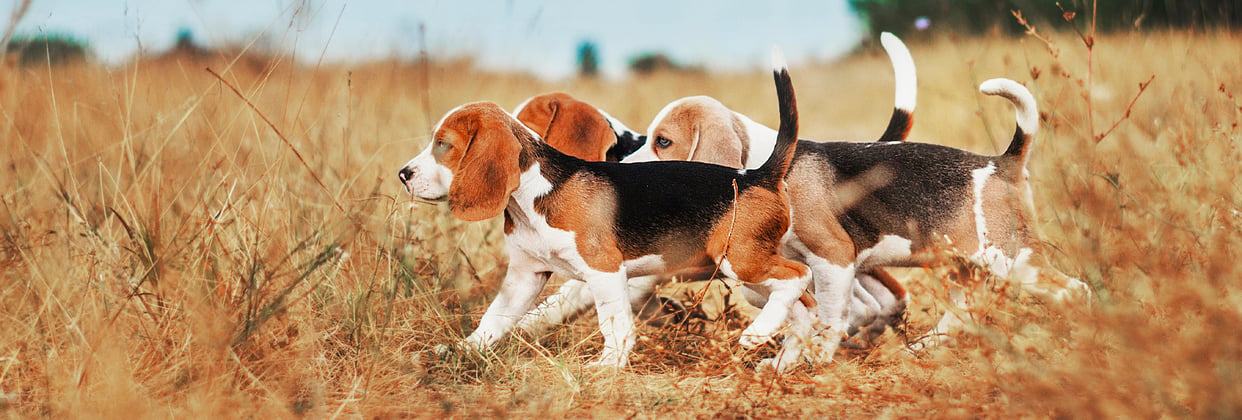

Temperament and behaviour.
Temperament
The Beagle is a popular dog breed known for their friendly nature and keen sense of smell. As a member of the hound group, Beagles were originally bred for hunting, but they have since become beloved family pets. Their temperament and behaviour are shaped by their history as pack animals and their strong hunting instinct.
Yes, Beagles generally make excellent pets. They are known for their friendly, gentle and merry disposition. Beagles are affectionate, good-natured and typically get along well with children and other dogs.
Their compact size and adaptable nature make them suitable for various living situations, from apartments to houses with yards.
Beagles are great family dogs. They are patient, tolerant, and love being part of family activities. Their playful nature and energy level make them excellent companions for children.
As with any dog, interactions between Beagles and young children should always be supervised.
Yes, Beagles are typically very good with kids. Their gentle temperament and playful nature make them ideal playmates for children.
They are usually patient and can tolerate the sometimes rough handling of young children. However, it's important to teach children how to interact properly with dogs to ensure a positive relationship.
Beagles can get along with cats, especially if they are raised together from a young age. However, due to their strong hunting instinct, some Beagles may see cats as prey.
Proper introduction and supervision are crucial when introducing a Beagle to a household with cats.
Beagles generally get along well with other dogs due to their pack mentality. They can also co-exist with other pets if properly socialised.
However, their strong prey drive may make them unsuitable for homes with small pets like rabbits or guinea pigs.


Behaviour
The Beagle's behaviour is influenced by its hunting background and pack mentality. Understanding these traits can help you keep your Beagle happy and healthy. To ensure your Beagle remains well-behaved, it's important to start training and socialisation at an early age.
Beagles can be prone to separation anxiety. As pack animals, they thrive on companionship and may become distressed when left alone for long periods. This can lead to destructive behaviour, excessive barking or attempts to escape.
Proper training and gradually accustoming them to being alone can help mitigate these issues.
While Beagles can be left alone for short periods, they generally don't do well when left alone for extended periods.
They are social dogs that crave companionship. If you need to leave your Beagle alone, it's best to limit it to no more than 4-6 hours and provide plenty of mental stimulation and exercise before and after.
Beagles can adapt to apartment living if given sufficient exercise and mental stimulation. It's important to keep in mind that some have a tendency to howl which may not be ideal for close-quarters living.
They also require regular outdoor exercise, so living in an apartment might require more effort from you as an owner to meet their activity needs.
Beagles are known for their vocal nature, but they don't typically bark excessively. Instead, they're famous for their distinctive howl or ‘bay’. This vocalisation is part of their hunting heritage, used to alert hunters when they've found prey.
While not constant barkers, Beagles may become vocal when excited, bored or left alone for long periods. Proper training and adequate mental and physical stimulation can help manage their vocalisations.
Training a Beagle.
Training a Beagle can be both rewarding and challenging. These intelligent and spirited dogs have a strong will and an even stronger nose, which can sometimes lead them astray during training sessions.
If you have patience, consistency, and positive reinforcement, you can successfully train your Beagle to be a well-behaved and happy family pet.
Are Beagles smart?
Beagles are intelligent dogs, but their smarts come with a dash of stubbornness that can sometimes be mistaken for a lack of intelligence. These clever pups were bred for hunting, which requires problem-solving skills and the ability to work independently.
Their keen sense of smell and tracking abilities are testament to their cognitive prowess. However, Beagles have a tendency to follow their noses, which can make them appear easily distracted during training sessions.
Just remember, their occasional selective hearing isn't a reflection of their IQ – it's just part of their charming, sometimes mischievous personality!
Are Beagles easy to train?
Beagles are intelligent dogs, but they can be challenging to train due to their independent nature and strong sense of smell. They may exhibit stubbornness and become easily distracted, especially by interesting scents.
With the right approach, Beagles can learn quickly and excel in various dog sports and activities.
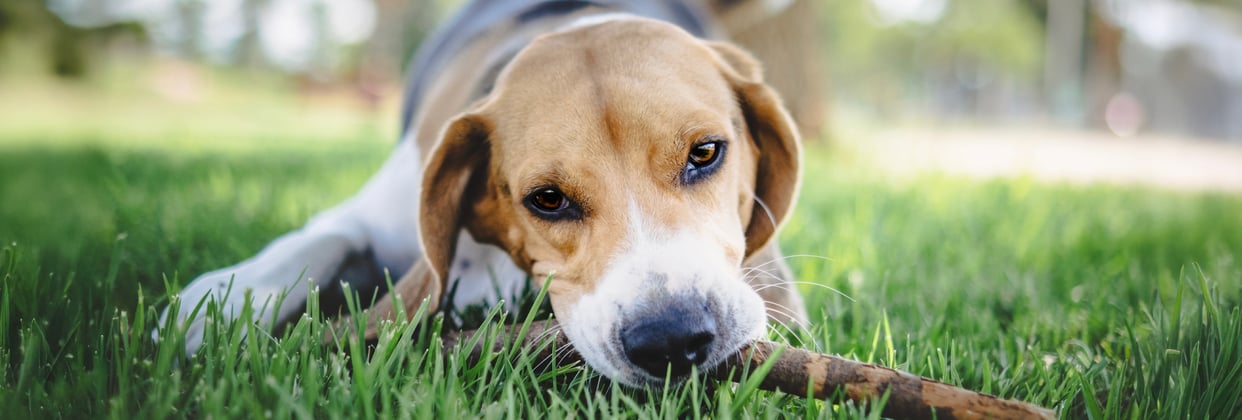

Shedding and grooming.
Beagles are generally considered low-maintenance when it comes to grooming, but they do require regular care to keep their coats healthy and minimise shedding.
How often should I brush my Beagle?
Beagles should be brushed at least once a week to remove loose hair and distribute natural oils throughout their coat. During shedding seasons, which typically occur twice a year, you may need to brush your Beagle more frequently, possibly every other day.
Regular brushing helps reduce the amount of hair shed around your home and keeps your Beagle's coat looking shiny and healthy. It's also a great opportunity to bond with your dog and check for any skin issues or abnormalities.
How often should I bathe my Beagle?
Beagles generally don't need frequent baths unless they get particularly dirty or smelly. On average, bathing your Beagle once every 4-6 weeks is sufficient. Over-bathing can strip the natural oils from their coat, leading to dry skin and increased shedding.
When you do bathe your Beagle, use a dog-specific shampoo to maintain the pH balance of their skin. After the bath, be sure to dry your Beagle thoroughly, paying special attention to their floppy ears to prevent ear infections.
How often should I cut my Beagle's hair?
Good news for Beagle owners! Your furry friend doesn't need regular haircuts. Beagles have a short, dense double coat that's designed to protect them from the elements. Unlike some other breeds, their hair doesn't keep growing endlessly.
In fact, trimming or shaving a Beagle's coat can actually interfere with their natural temperature regulation and remove their built-in protection against sun, cold, and pesky thorns during outdoor adventures.
That said, there might be times when a bit of strategic trimming is needed. If your Beagle has gotten into a particularly sticky situation (literally) with burrs or matted fur, you might need to carefully trim those specific areas.
But in general, a Beagle's coat is pretty low-maintenance.
Do Beagles shed?
Beagles are moderate to heavy shedders, so if you're dreaming of a fur-free home, you might want to invest in a good vacuum cleaner.
These pups shed year-round, but they really kick it into high gear twice a year during shedding seasons. Don't worry, though – there are ways to keep the fur tsunami under control.
Regular brushing (aim for once a week, more during heavy shedding periods) will help remove loose fur before it ends up all over your furniture. Plus, it's a great bonding activity for you and your Beagle.
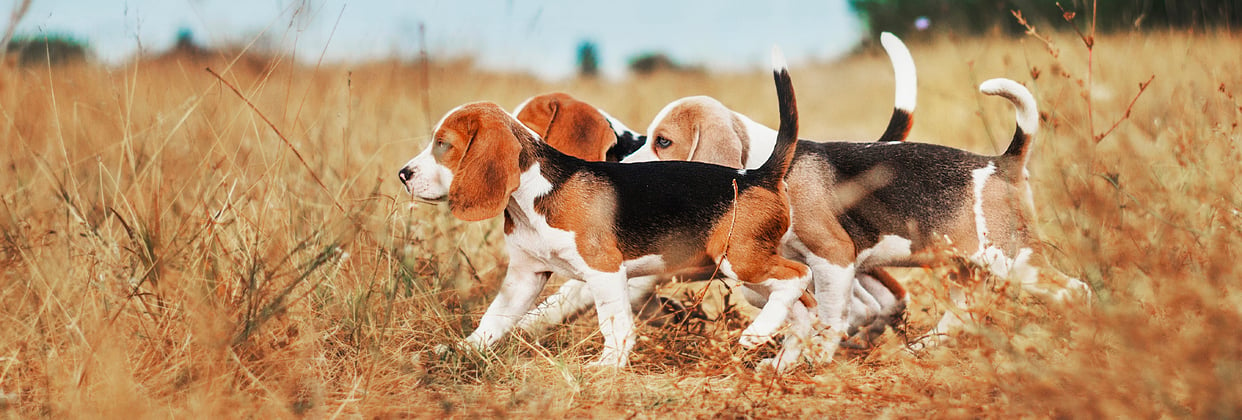

Nails and trimming.
Like any dog, your Beagle needs regular nail care to keep them happy and healthy. Whether you've got a bouncy
Beagle puppy or a distinguished adult dog, keeping those nails in check is crucial for their comfort and mobility.
Most Beagles need their nails trimmed every 4-6 weeks, but this can vary depending on your pup's lifestyle.
If your Beagle is constantly zooming around dog parks or taking long walks on hard surfaces, their nails might naturally wear down more quickly. On the flip side, if your Beagle prefers lounging on the sofa (we don't blame them!), you might need to break out the clippers more often.
Keep an ear out for the tell-tale 'click-clack' of nails on hard floors – that's your cue that it's trimming time.
Overgrown nails can cause discomfort and even affect your Beagle's gait, so regular checks are a must. Plus, nail trimming sessions are a great opportunity for some one-on-one bonding time with your furry friend.
Remember, if you're not confident about trimming your Beagle's nails yourself, don't hesitate to ask your vet or a professional groomer for help.
Exercise needs.
How much exercise does a Beagle need?
Beagles have a strong need for exercise, so get ready to lace up those trainers! These energetic pups, whether they're Beagle puppies or adult dogs, typically need about 60-90 minutes of daily activity to keep them happy and healthy.
But remember, every dog is unique – some Beagles may be couch potatoes in training, while others might give the Duracell Bunny a run for its money. A mix of walks and playtime, throughout the day will keep your Beagle's tail wagging.
Keep an eye on your pup and adjust their routine as needed. If your Beagle is bouncing off the walls or giving you those irresistible puppy eyes, they might be telling you it's time for some zoomies in the dog park.
Playtime and mental stimulation
Beagles are more than just a pretty face with floppy ears – they've got brains to match! Mental stimulation is just as crucial as physical exercise for keeping your Beagle happy and out of mischief.
These clever pups were developed as scent hounds, so their noses are always on high alert. Why not tap into that superpower? Hide treats around the house or garden and watch your Beagle's inner Sherlock come to life.
Interactive toys, puzzle feeders and training sessions are fantastic ways to keep your Beagle's mind sharp and prevent boredom-induced shenanigans.
Not only will these activities tire them out (a tired Beagle is a good Beagle!), but they'll also strengthen your bond.
Just remember, a bored Beagle can quickly turn into a mischievous Beagle, so mix up their playtime routine to keep things interesting.
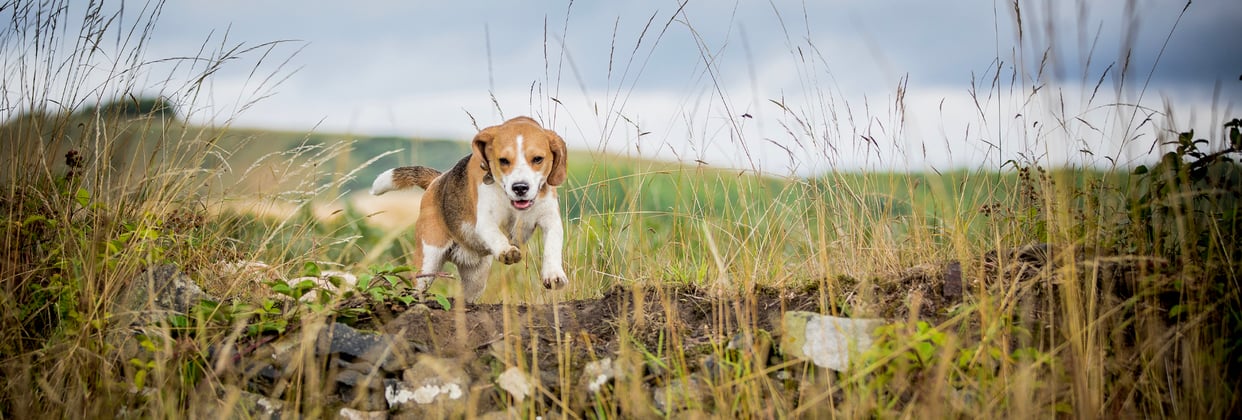

Feeding and nutrition.
The Beagle dog breed, like other breeds, require proper nutrition to ensure they are healthy and happy. Beagles are energetic dogs with hearty appetites, so it's important to provide them with a balanced diet that meets their nutritional needs without overfeeding.
How much food should a Beagle eat?
The amount of food a Beagle needs depends on factors such as age, size, activity level, and metabolism. As a general guideline:
Adult Beagles (1-7 years): 1.5 to 1.5 cups of high-quality dry dog food per day, divided into two meals.
Senior Beagles (7+ years): Slightly less, around 3/4 to 1 cup per day, to prevent weight gain as metabolism slows.
Beagle puppies: 1/2 to 1 cup per day, divided into three meals until 6 months old, then transition to adult feeding schedule.
Remember, these are just guidelines. Always consult with your vet to determine the best portion sizes for your individual Beagle dog.
What type of food should I feed my Beagle?
When choosing a dog food for your Beagle, look for high-quality options that meet these criteria:
High-quality protein sources (e.g., chicken, lamb, fish) as the first ingredient
Balanced mix of carbohydrates, fats, vitamins, and minerals
No artificial preservatives, colours, or flavours
Appropriate for your Beagle's life stage (puppy, adult, or senior)
Some Beagles tend to have food allergies, so you may need to experiment with different protein sources to find what works best for your pup.
At Waggel, we (and our dogs) love Butternut Box. They offer tailored, perfectly portioned meals using human-quality meat and vegetables, gently cooked to create simple, tasty, and complete meals with the right balance of vitamins and minerals for dogs of every age.
As a Waggel member, you can currently get 40% off your first two meal boxes with Butternut Box.
If your Beagle pups prefer kibble, Tails.com is another great option. They deliver both wet and dry food straight to your door with no extra fees.
Their flexible subscription means you can pause or cancel anytime. Waggel members can grab a free bag of kibble and get 50% off their entire first order with Tails.com.
Beagle common health issues.
Beagles are generally healthy dogs with an average lifespan of 10-15 years. However, like all dog breeds, they can be prone to certain health issues. Understanding these potential problems can help you provide the best care for your Beagle pups as they grow into adult dogs.
To give you a comprehensive overview of health conditions, treatments, and associated costs for Beagles, we've compiled the following information based on data from 2024 to 2025.
Hip dysplasia
This condition affects the hip joint, potentially leading to arthritis and mobility issues. Treatment can range from weight management and physical therapy to surgical interventions. Costs for managing hip dysplasia in Beagles typically range from £1,000 to £4,000, depending on the severity and chosen treatment approach.
Hypothyroidism
Beagles may develop an underactive thyroid gland, which can cause weight gain, lethargy and skin problems. Diagnosis usually involves blood tests, costing around £80 to £150. Treatment typically includes daily medication, with ongoing costs of approximately £20 to £40 per month for the life of your Beagle dog.
Eye problems
Beagles can be susceptible to various eye conditions, including glaucoma and cherry eye. Diagnostic tests may cost between £100 to £300. Treatment costs vary widely, from £50 for eye drops to £1,000 or more for surgical procedures, depending on the specific condition and its severity.
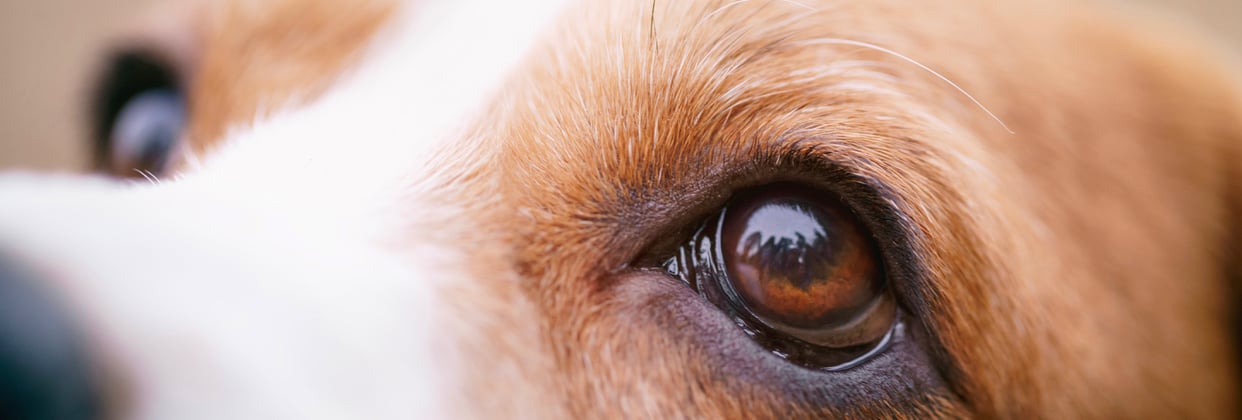

Ear infections
Due to their long, floppy ears, Beagles tend to be prone to ear infections. Regular cleaning can help prevent issues, but if an infection occurs, veterinary treatment may be necessary. Costs for treating ear infections typically range from £50 to £200 per episode, including medications and follow-up visits.
Epilepsy
Some Beagles may develop epilepsy, a neurological disorder causing seizures. Diagnosis can involve various tests, potentially costing £500 to £1,500. Ongoing management with anti-epileptic medications may cost £30 to £100 per month, depending on the size of your Beagle and the specific medication required.
Intervertebral disk disease (IVDD)
This condition affects the spinal cord and can cause pain, weakness, or paralysis. Treatment costs can vary significantly, from £500 for conservative management to £5,000 or more for surgical intervention in severe cases.
Pet insurance for Beagles.
As a Beagle owner, you want to ensure your furry friend receives the best care possible throughout their life. Pet insurance can provide peace of mind and financial protection against unexpected veterinary costs. At Waggel, we understand the unique needs of Beagles and offer comprehensive coverage to keep your pup healthy and happy.
As a Waggel member, you'll enjoy exclusive access to Joii Pet Care, a 24/7 online veterinary service. This means you can get expert advice for your Beagle anytime, anywhere, without the stress of in-person vet visits.
Whether you're concerned about your Beagle's appetite or need guidance on their exercise routine, Joii's qualified vets are just a video call away.
You'll also have the opportunity to connect with Junior Hudson of Companion Animal Wellness, our canine behavioural expert.
Junior can provide valuable insights into your Beagle's behaviour and nutrition, helping you understand and address any breed-specific traits or challenges.
By choosing Waggel for your Beagle's insurance needs, you're not just protecting your furry friend – you're joining a community of pet lovers dedicated to providing the best care possible. Get a quote today and give your Beagle the protection they deserve!


